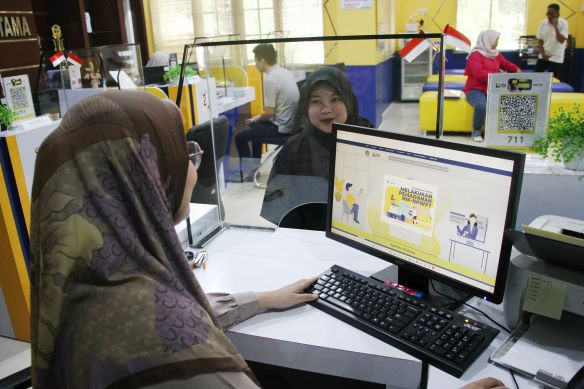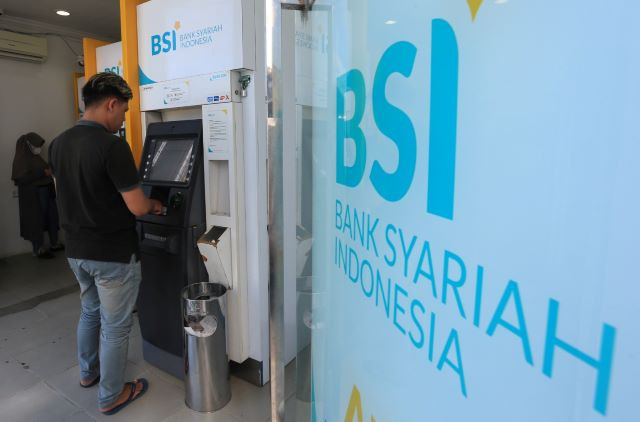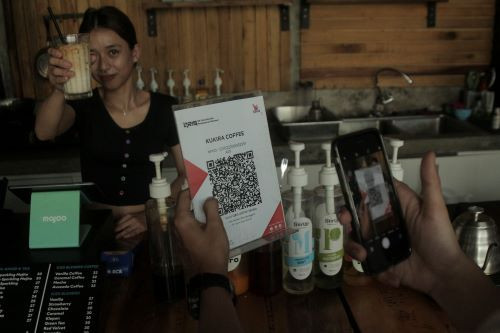Support for SMEs essential for expanding development
A report commissioned by Google meanwhile revealed that boosting the use of digital technologies such as e-commerce and social media among Indonesia’s SMEs could increase the country’s annual economic growth by 2 percent.
Change Size
 A report commissioned by Google meanwhile revealed that boosting the use of digital technologies such as e-commerce and social media among Indonesia’s SMEs could increase the country’s annual economic growth by 2 percent.
(Shutterstock/-)
A report commissioned by Google meanwhile revealed that boosting the use of digital technologies such as e-commerce and social media among Indonesia’s SMEs could increase the country’s annual economic growth by 2 percent.
(Shutterstock/-)
S
mall and medium-sized enterprises (SMEs) are essential to the economic performance of nearly every country in the world today. They are responsible for the largest share of employment opportunities in both developed and developing countries.
In Indonesia, micro, small and medium sized enterprises employ 97.7 percent of the total labor force and generate roughly 57.8 percent of the country’s economic output.
However, while these companies are very visible in the domestic economy, they are not nearly as prominent in the global marketplace.
In developed countries, for example, smaller companies comprise 78 percent of exporters but ship only 34 percent of total exports. In developing countries the situation is even more striking.
A survey of 25,000 smaller enterprises in developing countries found that exports constitute just 7.6 percent of their total sales. In Africa the figure is only 3 percent.
The problem is that some trade barriers disproportionately affect SMEs — and the smaller the business, the bigger the barriers can seem.
Meeting the required legal standards for products in different markets is often difficult for SMEs, but even the cost of finding information about those standards can be prohibitive.
Larger companies can absorb these costs, but for SMEs it can stop them from reaching new markets and therefore prevent them from being able to grow and expand. The World Trade Organization is looking at how we can respond to these problems and unleash the trading potential of SMEs — and we have just published a major new report on the issue.
Lowering tariffs would be a big boost to SMEs, as would making information and training on how to meet legal standards more readily available.
But our research has identified a range of other issues that we need to tackle. For example, smaller companies are less likely to be aware of international sales opportunities.
The same challenge exists when trying to establish how to market their goods and services in different countries and how to access distribution networks.
The internet offers a solution to many of these issues as it provides smaller companies with a way to reach customers around the world. An eBay study of 22 countries found that of small companies that do business online, 97 percent exported. Meanwhile, among those that did not engage in online sales, only 2 percent-28 percent generated sales abroad. So being connected is obviously essential.
However, of companies in developing countries with fewer than 10 employees, only 25 percent have their own websites. This compares with 85 percent for enterprises with more than 250 employees.
A report commissioned by Google meanwhile revealed that boosting the use of digital technologies such as e-commerce and social media among Indonesia’s SMEs could increase the country’s annual economic growth by 2 percent.
Higher digital engagement is also seen to deliver up to 80 percent higher growth in revenue for Indonesia’s SMEs and also make them one-and-a-half times more likely to increase employment.
SMEs are also at a distinct disadvantage when it comes to accessing trade finance. Globally, banks reject over 50 percent of all requests for trade financing placed by smaller firms — compared to just 7 percent for multinational companies. SMEs cite this as a major barrier to their capacity to trade, so action is needed.
SMEs also suffer more because of the costs involved in navigating complex and lengthy customs procedures — and this is one area where decisive action has already been taken. In 2013, WTO members reached the Trade Facilitation Agreement which will cut trade-related red tape and slash overall trade costs by more than 14 percent — a big benefit for SMEs.
The WTO’s mission is to set global trade rules and create an inclusive system which is open to everyone. Therefore it’s very welcome that our 164 members are now increasingly keen to explore what else can be done to help smaller companies to trade more effectively, with a particular focus on the potential of new online platforms.
This is a good start - and the conversation must continue. In a difficult global economic environment, governments and international organizations should be exploring every opportunity to create more jobs, trade and sustainable growth. SMEs have huge potential here to boost trade and rekindle economic activity. It is time we paid more attention to our smaller companies.
***
The writer is director general of the World Trade Organization (WTO).
---------------
We are looking for information, opinions, and in-depth analysis from experts or scholars in a variety of fields. We choose articles based on facts or opinions about general news, as well as quality analysis and commentary about Indonesia or international events. Send your piece to community@jakpost.com. Click here for more information.









